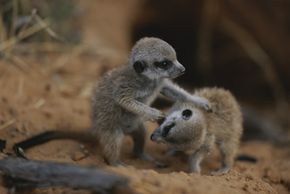Meerkat Reproduction
The alpha female meerkat is usually the largest female in the gang. She scratches and fights her way to the dominant position. She is the only female in the gang allowed to breed, and she breeds exclusively with the alpha male.
Meerkat society is one of cooperative breeding -- everyone pitches in to care for the young. When pups are born, they're hairless and unable to open their eyes or ears for at least 10 days. Nonbreeders take turns baby-sitting pups inside the burrow so the mother can forage for food. Pups won't emerge from the burrow until they're about three weeks old.
Advertisement
Elder meerkats are the educators. Meerkats rely more on mentoring than instinct when it comes to learning foraging and danger detection. Pups are weaned and become integrated into the group by the time they're a month old. But for their first three months, they don't yet know how to handle prey and find food so their baby-sitters continue to feed them.
Adults and pups all participate in play fighting. Young meerkats play fight to learn and to practice their skills, while adults use it to establish dominance within the gang.
Although the dominant female is the only female allowed to breed in the meerkat community, she's responsible for only 80 percent of litters produced [source: National Geographic]. Meerkats reach sexual maturity right around their first birthday, and some beta females will become pregnant before leaving the gang. Males initiate sex with females year-round by fighting with them. After a pregnancy of about 11 weeks, the female delivers a litter ranging from two to four pups [source: Honolulu Zoo].
When a beta female has babies, there are a few scenarios that can play out. The pups from the nondominant meerkat may be concealed and raised alongside other pups in the burrow. However, the likelihood of this is small, and researchers have learned that meerkats often practice infanticide. In an effort to maintain dominance and secure the most resources for her own babies, pregnant alpha females sometimes kill pups born to beta females. On the flip side, subordinate females may kill the alpha female's litter -- as well as pups birthed by other beta females -- in order to maximize the chance of survival and quality of care for their own young [source: National Geographic]. Researchers call this the dark side of cooperative breeding.
Related HowStuffWorks Articles
More Great Links
Sources
- Animal Diversity Web. Museum of Zoology. University of Michigan. http://animaldiversity.ummz.umich.edu/site/accounts/information/Suricata_suricatta.html
- Ashley Gosselin-Ildari, Ashley. " Suricata suricatta, Meerkat." NSF Digital Library at UT Austin. http://www.digimorph.org/specimens/Suricata_suricatta/
- Bellafante, Ginia. "'The Desert Has Lost Its Favorite Rose': Death Comes to the Whiskers Family." The New York Times. 2007. http://www.nytimes.com/2007/10/10/arts/television/10bell.html
- Fellow Earthlings' Wildlife Center. http://www.fellowearthlings.org/
- Honolulu Zoo. http://www.honoluluzoo.org/meerkat.htm
- "Lacey Act." Michigan State University College of Law. http://www.animallaw.info/statutes/stusfd16usca3371.htm
- "Lacey Act." U.S. Fish and Wildlife Service. Office of Law Enforcement. http://www.fws.gov/le/pdffiles/Lacey.pdf
- "Mammals: Meerkat." San Diego Zoo. http://www.sandiegozoo.org/animalbytes/t-meerkat.html
- Manser, Martha B. "Response of foraging group members to sentinel calls in suricates, Suricata suricatta." Department of Zoology, University of Cambridge. 1999. http://www.zool.uzh.ch/static/research/vb_manser/literatur/pdf99/Manser_1999.pdf
- "Meerkat." National Geographic. http://animals.nationalgeographic.com/animals/mammals/meerkat.html
- "Meerkat Biology and Behaviour." Kalahari Meerkat Project. http://www.kalahari-meerkats.com/index.php?id=about-meerkats
- Meerkats.net
- Norris, Scott. "Murderous Meerkat Moms Contradict Caring Image, Study Finds." National Geograhic. 2006. http://news.nationalgeographic.com/news/2006/03/0315_060315_meerkats.html
- Ray, C. Claiborne. "Q & A; Cat or Meerkat?" The New York Times. 2003. http://query.nytimes.com/gst/fullpage.html?res=9903E2DD113DF93AA35751C1A9659C8B63&n=Top%2FNews%2FScience%2FTopics%2FAnimals
